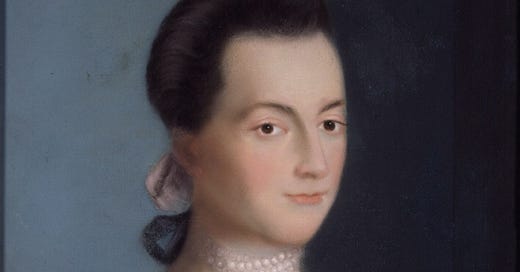
This is an installment of “Sestercenntenial Moments,” marking the 250th anniversary of the American Revolution and its memory in our national life. For more on the background of the series, see here.
On the morning of August 10, 1774, John Adams climbed aboard a four-horse coach in Boston with his cousin Sam and fellow lawyers Thomas Cushing and Robert Treat Paine for an eighteen-day trip to Philadelphia. The four had been chosen by the new Massachusetts Assembly—operating independently of the officially sanctioned British imperial one—to represent the colony at the First Continental Congress. Massachusetts had been in open revolt for months, and the four sought to build support among the other twelve colonies as part of an effort to forge a united front against Great Britain.
Nobody knew how it would go—and it wasn’t entirely clear how much support there actually was for Massachusetts. Indeed, some attendees were hoping for a reconciliation with Britain, and the meeting had been called as a more moderate alternative to a total ban on imports and exports that some had been calling for. (Cushing was among those who opposed independence, though he nevertheless remained a fixture of the Massachusetts government under the protective wing of his ally John Hancock until his death in 1785. As always, politics, as in so much in life, comes down to who you know.) Adams was pleased when the delegation—which began its days at five a.m.—had meals with local figures who supported their efforts. He did note that there were those who were “intimidated by fears of a civil war,” and others who worried that “the leveling spirit of New England colonies would propagate itself into N. York.” Still others were angling for jobs or professional advantage that a shuffling of the power deck might bring. On the whole, though, he was encouraged. As he noted in his diary of a stretch of the journey in Connecticut, “No governor of a province or general of an army was ever met with so much ceremony and assiduity as we have been.”
As always, Adams kept in touch with his wife Abigail, who was as acutely attuned to the political landscape as he was. “The great anxiety I feel for my country, and for our family renders the day tedious and the night unpleasant,” she wrote him on August 19. “The rocks and quicksands appear on every side. What course you can or will take is all wrapped in the bosom of uncertainty.” Abigail nevertheless tried to brace herself. “We are told that all the misfortunes of Sparta were occasioned by their too great solicitude for present tranquility, and by an excessive love of peace they neglected the means of making it sure and lasting.”
Her militance is striking. Like many New Englanders, she understood the struggle with Great Britain as less a revolution than a restoration—an effort to recapture the reality of independence that Massachusetts enjoyed before British encroachments on its liberty, culminating in the “invasion” of martial law in the aftermath of the Boston Tea Party. The analogy she chose for resistance was not democratic Athens but rather the warlike Spartans, and yet even they were a cautionary tale in allowing their vigilance to lapse. Abigail was clearly spoiling for a fight.
Her husband would have to be more diplomatic—a stance that did not come to him naturally. Still, he would play that role as needed upon his arrival in Philadelphia on August 29, 1774. By that point, Adams was a long way from home—farther indeed than he had ever been in his life. Abigail referred to Pennsylvania as “that far country.” And yet it would become his home, not simply in the sense that he would be spending a lot of time in Philadelphia for the next two years, or even that he and Abigail would live in Philadelphia as the capital of the United States after he was elected president. The Revolution would turn that far country into their country.
And ours.


